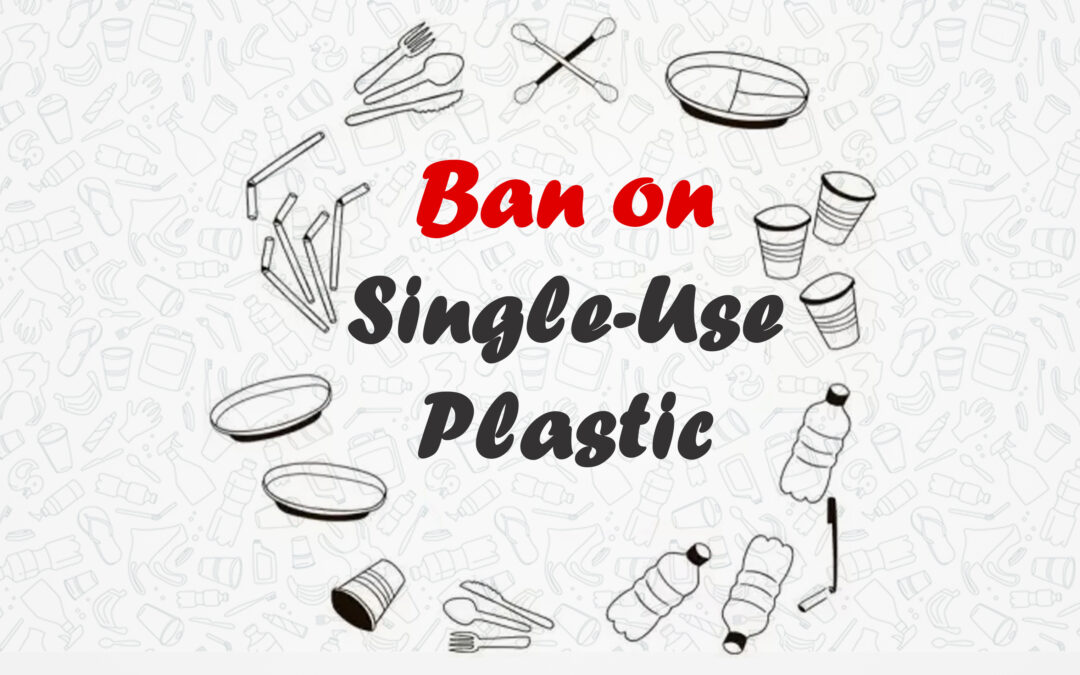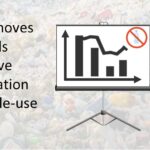Recent ban on ‘single use plastic’ (“SUP”) in India is a welcome step to fight environmental degradation of this planet. SUP means those disposable plastic items that are used only once or a few numbers of times until it is discarded or thrown away. The ban has been imposed to mitigate the pollution caused by littered SUPs as these plastics items are most difficult to collect and recycle and further, it has low usage but long environmental impact.
This ban which has been implemented from 1st July 2022 by the Ministry of Environment, Forest, and Climate Change prohibits the manufacture, import, and sale of 19 plastic items which includes
- ear buds with plastic sticks, plastic sticks for balloons, plastic flags, candy sticks, ice-cream sticks, polystyrene [Thermocol] for decoration.
- plates, cups, glasses, cutlery such as forks, spoons, knives, straw, trays, wrapping or packing films around sweet boxes, invitation cards, and cigarette packets, plastic, or PVC banners less than 100 micron, stirrers.
The penalties for the violation of ban are imprisonment up to 5 years or fine up to Rs.1,00,000, or both.
Though it is now widely known how harmful these SUP items are for the environment, ironically SUP items account for most of the plastics discarded as waste by us. As per the Minderoo Foundation Report of 2021, SUP account for a third of all plastic produced globally, with 98% manufactured from fossil fuels. India ranks 94 in the generation of single use plastic waste.
Before the said ban, one of the major amendments to the Plastic Waste Management Rules, 2021, was to increase the thickness of plastic carry bags from 50 microns to 75 microns and gradually to 120 microns which would be effective from 31st December 2022. Thickness of the bag determines the strength of the bag; the thinner the bag is the higher is its probability of breaking down and mixing with the soil which seriously deteriorates the environment. Therefore, the amendment put special emphasis on increasing the microns of plastic bags.
International Obligation – United Nations Environment Assembly
This ban on SUP is linked to the 4th United Nations Environment Assembly (UNEA) meeting held in 2019 where India had piloted a resolution on addressing single-use plastic pollution, bringing global focus on the issue. A substantial achievement in this regard has been made last year in the 5th UN Environment Assembly, where 175 countries resolved to constitute an Intergovernmental Negotiating Committee (“INC”). The INC is tasked with the responsibility of drafting an international legally binding instrument by the end of 2024 that will guide international action to phase out and eventually end plastic pollution.
Under the resolution, the Member States were directed to
-
adopt voluntary measures to combat plastic pollution
-
To develop and implement national action plans,
-
And to provide statistical information on environmentally sound management of plastic waste
Evolution of the law over time:
While it all started in 1999, the Recycled Plastics Manufacture and Usage Rules stated its objective to regulate the manufacture and use of recycled plastics, carry bags and containers under clause viii of sub section 2 of section 3 read with section 25 of the Environment Protection Act 1986.
Since then, the law has changed with course of time implementing different sets of rules with a motive for a better and healthy Environment.
In 2011, the provision was to make pigmented carry bags only using pigments that are in conformity with Indian Standards, but in 2016 an option to produce plastics of natural shade was provided. The pigments became a picture here because they are of organic nature and are hard to disperse making the plastic more sustainable. Further in 2022, single use plastics were banned altogether with effect from 1st July 2022.
Furthermore, under Plastic Waste Management Rules, the Producers, Importers, and Brand Owners are directed to fulfill certain obligations:
-
In 2011, it was maintained that no person should manufacture carry bags or recycle plastic bags or multi layered plastics without obtaining the registration certificate from State Pollution Control Board.
-
In 2016, the rules directed that the primary responsibility for collection of multi layered falls not only on the Producers and/or manufacturers but also on the producers and importers.
-
In 2022 producers, importers and brand owners are asked to provide Action Plan containing information on Extended Producer Responsibility target category wise, through the online centralized Portal developed by Central Pollution Control Board.
Extended Producer Responsibility
Extended producer responsibility is a policy method in which producers take responsibility for their organization regarding the disposal of plastic products they create which are no longer useful to the consumers. EPR deals with anything in respect to plastic packaging namely Reuse, Recycling, use of Recycled Plastic Content and end of life disposal.
Implications of SUP ban on different industries:
Although current ban has a limited impact on most of the corporate giants, it will have a direct impact on operations of certain industries such as:
FMCG Companies – These companies are facing difficulties in replacing plastic straws with paper-based straws because of sudden hike in demand and its low availability in the market.
E-shopping Companies – Major online retailers had to scrap SUP based packaging and replace it with recycled plastic, paper, or cardboard based packaging.
Food Aggregators – All packaging materials, including bags, cups, containers, and straws being covered under the curbs, the food aggregator is the sector that is facing most difficulties as the delivery costs can raise up to three or four times due to the lack of affordable alternatives for delivering gravy-based foods (such as curries or dairy) could raise.
Unlike the directly impacted industries, there are some industries that have been indirectly impacted in their day-to-day functioning. They are not waste producers but are termed as waste generators that means every person or group of persons or institutions, residential, and commercial establishments including Indian Railways, Airport, Port and Harbour and Defense establishments, places of worship which generate plastic waste. Such waste generators are obligated to segregate the wastes in three separate bins and handover segregated wastes to authorized waste collection agency or registered recyclers and pay the fees for the management of plastic waste. They are also required to take steps to minimize generation of plastic waste.
Impact of SUP ban on consumers:
As an effect of the ban, the consumers are the ones to be highly impacted. The prices of the eco-friendly alternatives are significantly higher than plastic. For example, the price of paper straws is 3-4 times higher than plastic straws, similarly the price of jute bags or paper bags are way more expensive than plastic bags. Further, the alternatives are not very easily available in the market. Therefore, ultimately the consumers will have to either bear the increased cost of product or make a habit of living without plastic products.
Unfortunately, in a recent study, it was shown that India generates an enormous amount of single use plastic waste nearly amounting to 5.5 million tonnes. Plastic waste pollutes rivers, soils, forests and even the aquatic ecosystem. Therefore, to save the planet from the hazards of plastic we should follow the principle of reduce reuse recycle and refuse.
To get a grip of all your compliances, get in touch with Lexplosion Solutions. Our Comprehensive Compliance Software Komrisk can help you mitigate all your legal risks.
References:
1.Plastic Waste Management Rules 2011 [The Plastic Waste (Management and Handling) Rules, 2011 (indiankanoon.org)]
2.Plastic Waste Management Rules 2016 [Plastic Waste Management Rules, 2016 English.pdf (mppcb.nic.in)]
3.Plastic Waste Management Rules 2022 [Plastic-Waste-Management-Amendment-Rules-2022-1.pdf (moef.gov.in)]
4.Plastic Waste Management Rules 2021 [SUP-notification-12082021.pdf (moef.gov.in)]
5.PIB notification [https://pib.gov.in/PressReleaseIframePage.aspx?PRID=1799170]
Written by: Dwaipayan Das, Debarjita Bhattacharjee, Satakshi Ganguly
Co Authored by: Amiya Mukherji
Disclaimer
All material included in this blog is for informational purposes only and does not purport to be or constitute legal or other advice. This blog should not be used as a substitute for specific legal advice. Professional legal advice should be obtained before taking or refraining from an action as a result of the contents of this blog. We exclude any liability (including without limitation that for negligence or for any damages of any kind) for the content of this blog. The views and opinions expressed in this blog are those of the author/(s) alone and do not necessarily reflect the official position of Lexplosion Solutions. We make no representations, warranties or undertakings about any of the information, content or materials provided in this blog (including, without limitation, any as to quality, accuracy, completeness or reliability). All the contents of this blog, including the design, text, graphics, their selection and arrangement are the intellectual property of Lexplosion Solutions Private Limited and/or its licensors.
ALL RIGHTS RESERVED, and all moral rights are asserted and reserved.


